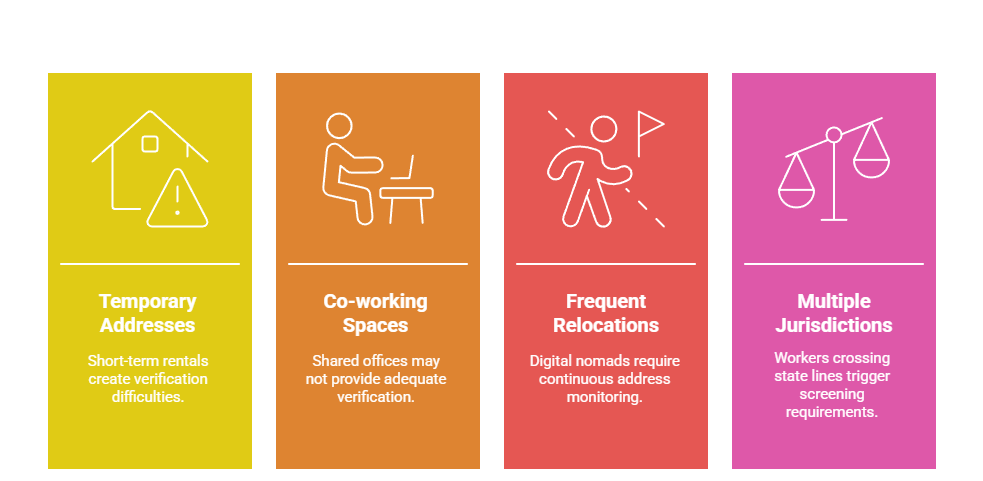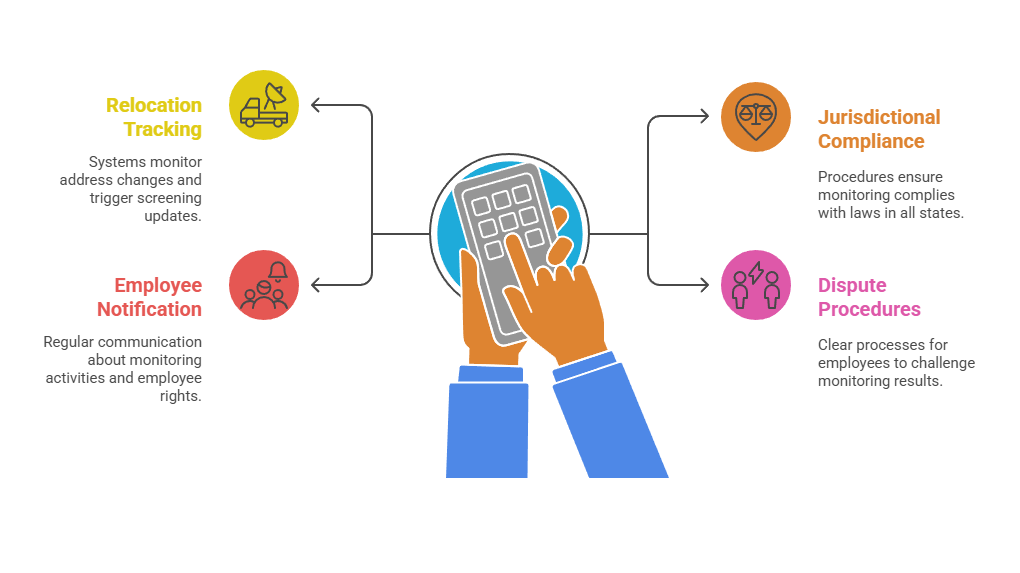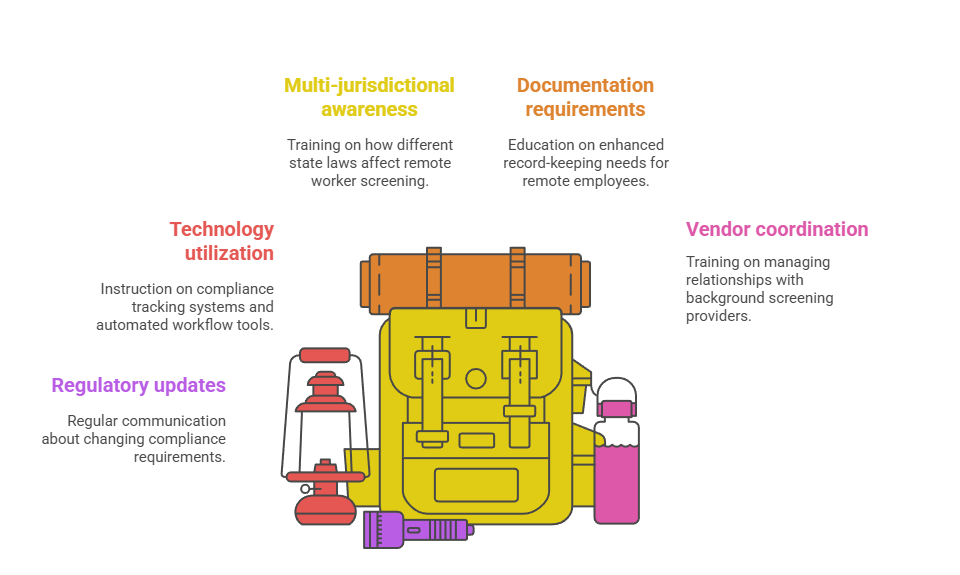The Fair Credit Reporting Act compliance requirements become more complex when managing remote workers, requiring employers to navigate multi-state jurisdictions, address verification challenges, and implement specialized protocols for telecommuting employees. Understanding these nuanced compliance obligations protects organizations from costly violations while ensuring thorough background screening processes.
Key Takeaways
- Multi-state compliance: Remote workers may trigger FCRA obligations across different state jurisdictions, each with unique requirements and timelines for background check processes.
- Address verification protocols: Employers must establish systematic procedures for verifying remote worker addresses and ensuring accurate reporting of location-based employment history.
- Enhanced documentation requirements: Remote background check compliance demands more detailed record-keeping and digital consent processes compared to traditional in-office hiring.
- Adverse action procedures: FCRA adverse action requirements for remote workers require modified communication protocols and extended timeframes to accommodate geographic distances.
- Third-party vendor management: Organizations must ensure their background screening vendors maintain FCRA compliance standards across all jurisdictions where remote employees work.
- Ongoing monitoring obligations: Fair Credit Reporting Act telecommuting compliance extends beyond initial hiring to include continuous monitoring and periodic re-screening requirements.
Understanding FCRA Basics for Remote Work Environments

The Fair Credit Reporting Act establishes federal requirements for conducting background checks. However, remote work arrangements introduce additional complexity layers. Traditional FCRA compliance assumes centralized hiring processes and consistent jurisdictional requirements.
Remote work environments challenge these assumptions by creating multi-state compliance obligations. Furthermore, they require enhanced verification procedures. Employers must now consider multiple jurisdictions simultaneously. This shift creates new challenges for compliance teams.
Remote background check compliance requires employers to understand how FCRA provisions apply across different geographic locations. Each state where remote employees work may impose additional requirements beyond federal FCRA mandates. Consequently, employers must navigate varying state laws regarding background check timing, disclosure requirements, and adverse action procedures. Moreover, these requirements change frequently as states update their legislation.
The shift toward telecommuting has increased scrutiny from regulatory agencies regarding FCRA compliance practices. Consumer Financial Protection Bureau enforcement actions have specifically targeted employers who fail to properly implement FCRA requirements for distributed workforces. Additionally, state attorneys general have increased their focus on multi-jurisdictional compliance violations. Organizations must proactively address these compliance gaps to avoid costly penalties and legal challenges.
Key FCRA Provisions Affecting Remote Workers
Federal FCRA requirements remain consistent regardless of employee location. Nevertheless, implementation becomes more challenging with remote workers. Employers must provide proper disclosures, obtain written authorization, and follow adverse action procedures for all background checks.
The geographic distribution of remote employees complicates these seemingly straightforward requirements. Additionally, remote work arrangements often involve employees relocating frequently or working from multiple locations throughout the year. This mobility creates ongoing compliance obligations as employers must track location changes and ensure continued adherence to local requirements.
State-Specific Compliance Requirements
FCRA compliance for remote workers requires understanding state-level variations in background check regulations. States like California, New York, and Illinois impose additional restrictions beyond federal FCRA requirements. These restrictions may include limitations on criminal history inquiries, extended adverse action timeframes, and enhanced disclosure requirements. Furthermore, some states have implemented fair chance legislation that significantly impacts hiring processes.
Remote employees working across state lines may trigger compliance obligations in multiple jurisdictions simultaneously. Employers must identify which state laws apply based on employee residence, work location, and company headquarters. This determination affects everything from permissible background check scope to required notification procedures. Additionally, it influences the timing of when background checks can be conducted.
| State | Key Remote Work Considerations | Additional Requirements |
| California | Fair Chance Act compliance | 7-year criminal history limit |
| New York | Article 23-A protections | Individual assessment requirements |
| Illinois | Employee Location Privacy Act | Geolocation disclosure mandates |
| Texas | Limited state-specific restrictions | Primary focus on federal compliance |
Maintaining compliance across multiple states requires robust tracking systems and regular policy updates. Organizations must monitor legislative changes in each jurisdiction where remote employees work and adjust their background screening processes accordingly.
Remote Address Verification Challenges
FCRA home address verification presents unique challenges when employees work from non-traditional locations. Traditional background checks rely on stable residential addresses for conducting county-level criminal searches and employment verifications. Remote workers may use temporary addresses, co-working spaces, or frequently change locations, complicating standard verification procedures.

- Temporary addresses: Short-term rental properties and extended-stay accommodations create verification difficulties
- Co-working spaces: Shared office environments may not provide adequate address verification for background screening purposes
- Frequent relocations: Digital nomads and mobile workers require continuous address monitoring and updated screening procedures
- Multiple jurisdictions: Workers crossing state lines may trigger additional screening requirements in each location
Employers must establish protocols for verifying and regularly updating remote worker addresses to ensure comprehensive background screening coverage. This includes implementing systems for tracking address changes and determining which jurisdictions require additional screening when employees relocate.
Address Documentation Requirements
Enhanced documentation becomes critical for remote background check compliance due to the increased complexity of multi-jurisdictional requirements. Employers must maintain detailed records of employee locations, screening procedures used, and compliance measures implemented for each jurisdiction. This documentation serves as evidence of good-faith compliance efforts during regulatory examinations or legal challenges.
Digital consent processes require special attention to ensure FCRA compliance standards are met when employees complete authorization forms remotely. Organizations must verify employee identity, maintain secure document storage, and ensure proper disclosure delivery across various digital platforms. These processes must accommodate employees in different time zones and with varying technology access levels. Additionally, they must comply with electronic signature laws in applicable jurisdictions.
Adverse Action Procedures for Remote Employees

Fair Credit Reporting Act telecommuting compliance requires modified adverse action procedures to accommodate geographic distances and communication challenges. Standard adverse action timelines assume in-person or local mail delivery. However, remote employees may experience delays in receiving required notifications. Therefore, employers must account for these potential delays and implement extended timeframes to ensure proper compliance.
Remote adverse action procedures must address varying state requirements for notification methods and timelines. Some states require specific delivery methods or additional waiting periods before taking final adverse action. Consequently, employers must track these requirements for each employee location and adjust their procedures accordingly. Moreover, they must document their efforts to comply with the most restrictive applicable requirements.
Communication challenges with remote employees during adverse action periods require proactive management strategies. Employers should establish multiple communication channels and confirm receipt of adverse action notifications before proceeding with final employment decisions. This approach helps demonstrate compliance with FCRA requirements while maintaining professional relationships with affected candidates. Additionally, it reduces the risk of claims regarding inadequate notice.
| Adverse Action Step | Remote Work Considerations | Compliance Best Practices |
| Pre-adverse action notice | Extended delivery times across states | Use certified mail with tracking and email confirmation |
| Waiting period | Varying state requirements for timelines | Apply longest applicable waiting period organization-wide |
| Final adverse action notice | Multi-jurisdictional notification requirements | Maintain detailed delivery confirmation records |
Organizations should develop standardized templates and procedures specifically designed for remote employee adverse actions. These materials must comply with the most restrictive applicable state requirements while maintaining federal FCRA compliance standards.
Documentation and Record-Keeping for Adverse Actions
Remote adverse action procedures generate significantly more documentation than traditional processes. Employers must track delivery confirmations, communication attempts, and compliance with multiple jurisdictional requirements. This enhanced record-keeping serves as protection during regulatory examinations and potential litigation.
Technology solutions can help automate much of the documentation process for remote adverse actions. However, employers must ensure these systems capture all required information and maintain audit trails for compliance purposes. Regular reviews of documentation procedures help identify gaps and ensure continued compliance effectiveness.
Vendor Management and Third-Party Compliance
Third-party background screening vendors play a crucial role in maintaining FCRA compliance for remote workers. Nevertheless, employers retain ultimate responsibility for compliance violations. Organizations must ensure their vendors understand multi-state compliance requirements and can accommodate the additional complexity of remote workforce screening. This includes verifying that vendors maintain proper licensing in all relevant jurisdictions and stay current with changing state requirements.
Vendor contracts should specifically address remote worker compliance obligations and allocate responsibility for various compliance tasks. Key considerations include which party handles multi-state legal research, who maintains compliance with changing state laws, and how the vendor will accommodate enhanced documentation requirements. Clear contractual provisions help prevent compliance gaps and provide recourse when violations occur. Additionally, contracts should specify performance standards and remediation procedures for compliance failures.
Regular vendor audits become more important when screening remote workers due to the increased compliance complexity. Employers should verify that vendors maintain appropriate procedures for each jurisdiction where employees work and can demonstrate ongoing compliance monitoring. These audits should include reviews of vendor compliance training, policy updates, and quality control measures. Furthermore, they should assess the vendor's ability to adapt to changing regulatory requirements across multiple jurisdictions.
Vendor Selection Criteria for Remote Workforce Screening
Selecting appropriate background screening vendors for remote workforce management requires evaluation of specialized capabilities. Vendors must demonstrate expertise in multi-jurisdictional compliance and maintain current knowledge of changing state requirements. They should also provide technology solutions that support enhanced documentation and tracking requirements.
| Vendor Capability | Evaluation Criteria | Risk Mitigation Factors |
| Multi-state licensing | Current licenses in all employee locations | Regular renewal tracking and compliance monitoring |
| Technology platform | Integration capabilities and audit trail features | Data security and system reliability measures |
| Compliance expertise | Demonstrated knowledge of changing regulations | Training programs and legal update services |
Ongoing vendor performance monitoring ensures continued compliance as remote workforce needs evolve. Regular performance reviews should assess compliance metrics, turnaround times, and quality control measures across different jurisdictions.
Ongoing Monitoring and Periodic Re-screening
FCRA compliance for remote workers extends beyond initial hiring to include ongoing monitoring obligations throughout the employment relationship. Remote employees may relocate to new jurisdictions, triggering additional screening requirements or compliance obligations. Employers must establish systems for tracking these changes and implementing appropriate follow-up screening procedures. Additionally, they must ensure that ongoing monitoring programs comply with applicable state restrictions.
Periodic re-screening of remote employees requires careful attention to FCRA requirements and state-specific limitations. Some states restrict the frequency and scope of ongoing background checks. Meanwhile, others may require additional disclosures for continuous monitoring programs. Organizations must balance security needs with compliance requirements while respecting employee privacy rights.
The implementation of continuous monitoring systems for remote workers must comply with FCRA disclosure and authorization requirements. Employees must receive proper notice of ongoing screening activities and provide appropriate consent for continuous monitoring. These systems must also accommodate employees who relocate to states with different monitoring restrictions or prohibited practices. Furthermore, they must provide mechanisms for employees to dispute ongoing monitoring results.

- Relocation tracking: Systems to monitor employee address changes and trigger appropriate screening updates
- Jurisdictional compliance: Procedures to ensure ongoing monitoring complies with laws in all applicable states
- Employee notification: Regular communication about ongoing monitoring activities and employee rights
- Dispute procedures: Clear processes for employees to challenge ongoing monitoring results or request corrections
Technology solutions can automate many aspects of ongoing monitoring while maintaining compliance with FCRA requirements. However, human oversight remains essential to address complex compliance issues and employee concerns.
Technology Integration for Compliance Tracking
Modern compliance tracking systems help organizations manage the complexity of multi-state FCRA requirements for remote workers. These platforms should provide real-time updates on changing state requirements, automated compliance workflows, and comprehensive audit trails for regulatory examinations. Investment in appropriate technology solutions can significantly reduce compliance risks and administrative burdens.
Integration between HRIS systems and compliance tracking platforms enables automated monitoring of employee location changes and triggering of required compliance actions. Organizations should evaluate technology solutions based on their ability to handle multi-jurisdictional requirements, provide regulatory updates, and maintain comprehensive compliance documentation. Additionally, they should assess the vendor's commitment to ongoing platform development and regulatory updates.
Training and Internal Compliance Programs
Successful FCRA compliance for remote workers requires comprehensive training programs that address the unique challenges of distributed workforces. HR professionals and hiring managers must understand how geographic factors affect FCRA requirements and be able to implement appropriate procedures for different scenarios. Regular training updates ensure continued compliance as regulations and business practices evolve. Moreover, training must address both federal requirements and state-specific variations.
Internal compliance programs should establish clear roles and responsibilities for managing remote worker background screening. Designated personnel must understand multi-state compliance requirements and maintain current knowledge of regulatory changes. These individuals should serve as resources for hiring managers and coordinate with legal counsel when complex compliance issues arise. Additionally, they should maintain relationships with background screening vendors and monitor their performance.
Documentation of training programs and internal compliance efforts demonstrates organizational commitment to FCRA compliance. This documentation becomes valuable during regulatory examinations and helps establish good faith compliance efforts. Regular assessments of training effectiveness ensure that staff members retain necessary knowledge and can adapt to changing requirements. Furthermore, training records help identify areas where additional education may be needed.

- Multi-jurisdictional awareness: Training on how different state laws affect remote worker screening
- Documentation requirements: Education on enhanced record-keeping needs for remote employees
- Technology utilization: Instruction on compliance tracking systems and automated workflow tools
- Vendor coordination: Training on managing relationships with background screening providers
- Regulatory updates: Regular communication about changing compliance requirements
Training programs should be tailored to different roles within the organization, with more detailed instruction for personnel directly involved in background screening processes.
Performance Monitoring and Quality Assurance
Internal quality assurance programs help ensure consistent FCRA compliance across all remote worker screening activities. Regular audits of compliance procedures identify gaps and areas for improvement. These reviews should assess documentation quality, adherence to procedures, and effectiveness of training programs. Additionally, they should evaluate the organization's ability to adapt to changing regulatory requirements.
Performance metrics for FCRA compliance should include measures of timeliness, accuracy, and regulatory adherence across different jurisdictions. Regular reporting on these metrics helps identify trends and potential compliance issues before they become significant problems. Furthermore, performance data supports continuous improvement efforts and helps justify investments in compliance infrastructure.
Risk Assessment and Mitigation Strategies
Comprehensive risk assessment for FCRA compliance with remote workers involves evaluating exposure across multiple dimensions. Geographic distribution of employees creates varying levels of regulatory risk based on state-specific requirements and enforcement patterns. Organizations must assess their current compliance posture and identify areas of highest risk exposure. This assessment should consider both the likelihood of violations and potential financial and reputational impacts.
Risk mitigation strategies should prioritize the most significant compliance exposures while building comprehensive protection across all jurisdictions. High-risk areas typically include states with complex background check regulations, active enforcement agencies, and significant penalties for violations. Organizations should implement enhanced compliance measures in these jurisdictions while maintaining baseline protections everywhere else. Additionally, they should establish contingency plans for responding to compliance violations or regulatory examinations.
Regular risk assessment updates ensure that mitigation strategies remain effective as business operations and regulatory environments change. New state legislation, regulatory guidance updates, and enforcement pattern changes all affect risk profiles. Organizations must maintain current awareness of these developments and adjust their compliance strategies accordingly. Furthermore, they should conduct periodic assessments of vendor performance and technology solution effectiveness.
| Risk Category | Assessment Factors | Mitigation Strategies |
| Regulatory violations | State-specific requirements and enforcement patterns | Enhanced procedures in high-risk jurisdictions |
| Vendor compliance failures | Third-party performance and oversight capabilities | Regular audits and performance monitoring |
| Technology system failures | Platform reliability and data security measures | Backup systems and incident response procedures |
Effective risk management requires ongoing attention and regular strategy updates as the remote work landscape continues to evolve.
Compliance Cost Management
Managing the costs associated with multi-jurisdictional FCRA compliance requires strategic planning and efficient resource allocation. Enhanced compliance requirements for remote workers typically increase both direct costs and administrative overhead. Organizations must balance compliance needs with budget constraints while avoiding the much higher costs of regulatory violations.
Cost optimization strategies should focus on areas where efficiency improvements provide the greatest compliance benefits. Technology solutions that automate routine compliance tasks often provide positive returns on investment. Similarly, standardizing procedures across jurisdictions can reduce training costs and improve consistency. However, organizations must ensure that cost-cutting measures do not compromise compliance effectiveness or create new risk exposures.
Future Trends and Regulatory Developments
The regulatory landscape for remote worker background screening continues to evolve as states adapt their laws to address changing work patterns. Recent legislative trends include increased restrictions on criminal history inquiries, enhanced employee privacy protections, and expanded disclosure requirements. Organizations must stay informed about these developments and adapt their compliance strategies accordingly. Additionally, federal agencies continue to refine their enforcement approaches for multi-jurisdictional compliance issues.
Technology developments in background screening and compliance management offer new opportunities for improving FCRA compliance with remote workers. Artificial intelligence and machine learning applications can help automate complex compliance decisions and identify potential issues before they become violations. However, organizations must ensure that these technologies comply with applicable regulations and maintain appropriate human oversight. Furthermore, they must address privacy and fairness concerns associated with automated decision-making systems.
The continued growth of remote work will likely drive additional regulatory attention to multi-jurisdictional compliance issues. Employers should expect increased scrutiny from federal and state agencies regarding their remote worker screening practices. Proactive compliance efforts and comprehensive documentation will become increasingly important for demonstrating good faith efforts to comply with complex regulatory requirements. Moreover, industry best practices will continue to evolve as more organizations develop expertise in this area.
- Legislative trends: Increasing state-level restrictions and enhanced employee protections
- Enforcement patterns: Growing focus on multi-jurisdictional compliance by regulatory agencies
- Technology advances: New tools for automating compliance processes and improving accuracy
- Industry standards: Developing best practices for remote workforce background screening
- Litigation risks: Increasing class action lawsuits related to background screening practices
Organizations that invest in robust compliance programs now will be better positioned to adapt to future regulatory changes and enforcement actions.
Conclusion
FCRA compliance for remote workers demands heightened attention to multi-jurisdictional requirements and enhanced procedural safeguards that go beyond traditional background screening practices. Organizations must proactively address the unique challenges of verifying remote employee information, managing adverse action procedures across geographic distances, and maintaining ongoing compliance monitoring. Success requires investment in appropriate technology solutions, comprehensive staff training, and robust vendor management practices. The complexity of remote workforce compliance makes professional legal guidance essential for organizations seeking to minimize regulatory risks while maintaining effective screening programs.
Frequently Asked Questions
Do FCRA requirements change when employees work remotely from different states?
While federal FCRA requirements remain consistent, remote employees may trigger additional state-specific compliance obligations based on their work location. Employers must comply with both federal FCRA requirements and applicable state laws in each jurisdiction where remote employees work.
How should employers handle address verification for remote workers who frequently relocate?
Employers should establish systematic procedures for tracking and verifying remote employee addresses, including regular update requirements and protocols for conducting additional background checks when employees move to new jurisdictions with different screening requirements.
What modifications are needed for adverse action procedures with remote employees?
Remote adverse action procedures should account for potential mail delivery delays, include multiple communication methods, and comply with varying state requirements for notification timelines and methods. Extended timeframes may be necessary to ensure proper compliance.
Are there specific FCRA disclosure requirements for remote worker background checks?
Standard FCRA disclosure requirements apply to all background checks regardless of employee location. However, the delivery method and documentation of receipt may require enhanced procedures for remote employees to ensure compliance with both federal and state requirements.
How frequently can employers conduct ongoing background checks for remote workers?
The frequency of ongoing background checks depends on applicable state laws, with some states limiting periodic re-screening activities. Employers must obtain proper FCRA authorization for continuous monitoring and comply with state-specific restrictions on ongoing screening practices.
What vendor management considerations are unique to remote worker background screening?
Employers must ensure their background screening vendors maintain appropriate licensing and compliance capabilities across all jurisdictions where remote employees work. This includes verifying vendor procedures for multi-state compliance and conducting regular audits of vendor compliance practices.
How do state fair chance laws affect remote worker background screening?
State fair chance laws may restrict when and how employers can conduct background checks on remote workers. Some states prohibit criminal history inquiries until after conditional job offers, while others require individual assessments of criminal history relevance to job duties.
What documentation is required for multi-state FCRA compliance with remote workers?
Enhanced documentation requirements include tracking employee locations, maintaining records of applicable state requirements, documenting compliance procedures used, and preserving evidence of proper disclosure and authorization for each jurisdiction.
Additional Resources
- Fair Credit Reporting Act - Complete Federal Statute
https://www.ftc.gov/legal-library/browse/statutes/fair-credit-reporting-act - CFPB FCRA Compliance Guide for Employers
https://www.consumerfinance.gov/compliance/compliance-resources/other-applicable-requirements/background-screening/ - State-by-State Background Check Law Summary
https://www.shrm.org/resourcesandtools/legal-and-compliance/state-and-local-updates/pages/state-background-check-laws.aspx - EEOC Guidance on Background Check Compliance
https://www.eeoc.gov/laws/guidance/enforcement-guidance-consideration-arrest-and-conviction-records-employment - Remote Work Compliance Best Practices Guide
https://www.napbs.com/page/ComplianceResources

GCheck Editorial Team
Meet the GCheck Editorial Team, your trusted source for insightful and up-to-date information in the world of employment background checks. Committed to delivering the latest trends, best practices, and industry insights, our team is dedicated to keeping you informed.
With a passion for ensuring accuracy, compliance, and efficiency in background screening, we are your go-to experts in the field. Stay tuned for our comprehensive articles, guides, and analysis, designed to empower businesses and individuals with the knowledge they need to make informed decisions.
At GCheck, we're here to guide you through the complexities of background checks, every step of the way.






